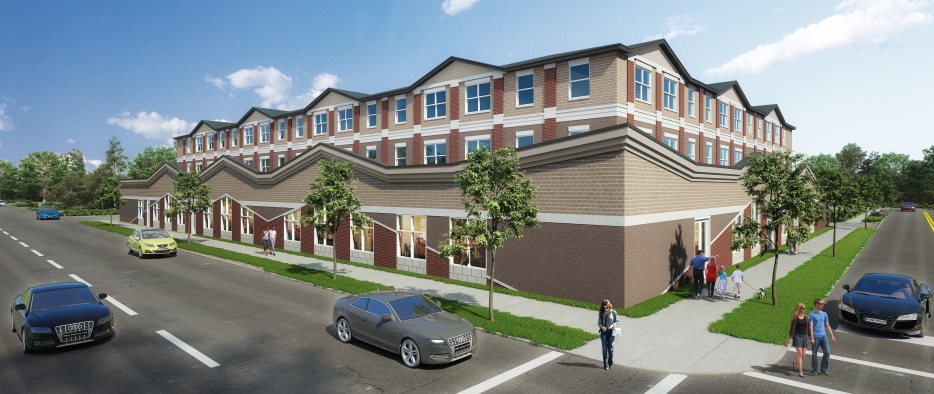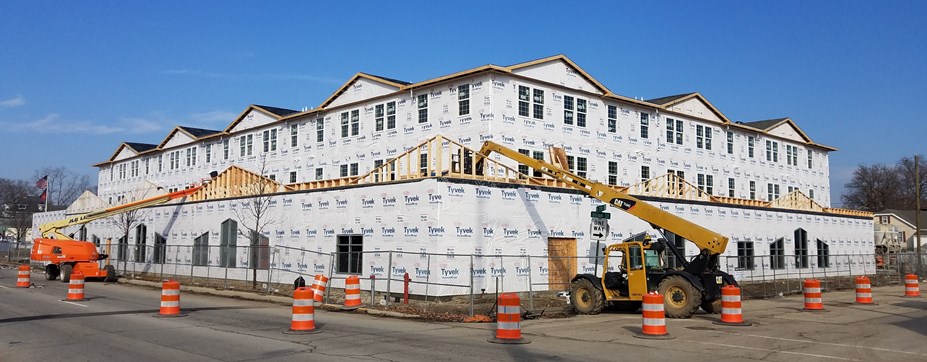$4 Million Grant Tackles Link Between Health and Homelessness

North Central Health Services (NCHS) today announced the last of three grants totaling $4 million for local housing and homeless support agency LTHC Homeless Services to aid in eradicating homelessness from the local community through the construction of the new LTHC Homeless Services Engagement Center.
LTHC, a nonprofit organization that helps local individuals and families in need find stable housing and self-sufficiency, will use the grant to construct the coordinated entry, multi-agency facility for supportive housing, case management and health care for the homeless.
As the American Hospital Association and others have identified, when health care systems and community partners engage together on collaborative projects such as this, not only are the health and life outcomes of the people served more significant than when those organizations work independently —the health care systems, community collaborators and people served each often realize substantial savings. Partnerships like these are finding success from Oregon to Ohio.
“It takes a community to end homelessness together,” said LTHC Executive Director Jennifer Layton. “That’s why we’re designing our Engagement Center with space for as many other nonprofits as possible so that our guests can have access to the support and resources they need, all in one place.”
“Our 2015 and 2018 Community Health Needs Assessments clearly identified three community needs that the Homeless Services Engagement Center will directly address in one innovative and collaborative project: housing access, primary care medical access and mental health care access,” said Stephanie Long, NCHS president and CEO. NCHS and its nonprofit inpatient psychiatric facility River Bend Hospital conduct the assessment every three years.
Engagement Center
The Engagement Center is the result of a five-year planning process with stakeholders and community groups, including city officials and the local United Way agency.
The Engagement Center will serve as the county’s first stop for anyone experiencing homelessness to connect with housing opportunities, services and even health care. The project includes:
- Colocation of LTHC and other local agencies who serve the homeless in one location
- Colocation of homeless services with behavioral and primary health care services
- 40 supportive housing apartments for individuals with chronic challenges to housing stability
- Colocation of LTHC and partner agency services “at home” for supportive housing residents
- New and expanded facilities for clients, including a hot room, mailboxes, lockers, bike racks, private outdoor space, showers, laundry and a hair-cutting station
The project will expand LTHC’s and partner agencies’ capacities to serve an expanding service population, with space for expansion into new programs as funding is available. If LTHC is successful in their planned campaign, the Engagement Center will also provide 24/7 accessibility to emergency housing, interim housing for individuals awaiting their permanent housing solutions and medical respite for homeless individuals recovering from medical procedures.

Health Outcomes
The project’s potential impact on individuals with severe mental illness, addictions and chronic health conditions was particularly compelling to NCHS when considering the organization’s grant proposal.
LTHC’s supportive housing program provides multi-year housing and case management to the most vulnerable homeless individuals — those with substantial barriers to housing stability including severe mental illness and chronic health challenges. All of LTHC’s supportive housing clients have either a physical or mental health condition, and 60% are challenged by three or more disabling conditions. These individuals are not typically able or qualified to rent or maintain independent housing, even with subsidies.
The new Engagement Center includes 40 apartment units for these supportive housing clients. Stable housing and supportive services will give these clients the opportunity and assistance they need to manage their health conditions.
“When we provide housing to those who have the most substantial barriers and provide them with critical health care services, we see an almost immediate improvement in their lives,” said Layton.
Kurt” became an LTHC client after experiencing homelessness for 18 months when his mother died. He was both financially and emotionally wrecked from that experience and ended up on the streets. Kurt suffers from epilepsy, memory and hearing loss, as well as severe depression and anxiety. After 18 months of supportive housing and medical care, Kurt’s conditions are now well-managed and he has moved on to independent housing. He continues to work with the health care providers with whom he was connected in supportive housing and states he is hopeful for his future.
Permanent supportive housing research shows outcomes that impact the community as well as the individual: improving medical appointment attendance, improving mental health appointment attendance, reducing medical inpatient admissions, reducing emergency room visits and reducing incidents of domestic violence and arrests.
All LTHC clients will benefit from the Engagement Center’s expansion of onsite physical and behavioral health services for the homeless, as well as substance abuse, mental health and domestic violence support groups.
“We know there is a direct link between health and homelessness,” said Layton. “If we want to improve their overall health, we must end their homelessness.”
When homeless individuals’ health issues require serious medical intervention, they often do not have an appropriate place for bedrest or recovery, nor assistance with basic services like wound care. Because they are unable to heal properly, the lack of appropriate respite in some cases leads to complications, further damage to their health and repeated visits to emergency rooms. Medical respite has been proven to improve recovery outcomes and reduce emergency room utilization.
LTHC wants to end the cycle by providing short-term respite rooms that allow homeless individuals the opportunity to recover in a safe environment while accessing medical care and other supportive services.
“Homeless patients who are discharged to a medical respite program experience 50% fewer hospital readmissions within 90 days of being discharged than patients who are discharged to homelessness. These types of outcomes improve the overall health of our entire community,” said Long.
Collaboration
NCHS has long championed authentic nonprofit collaboration between community organizations. The Engagement Center project will build on and scale-up collaborations already underway between LTHC and other organizations in the community serving the homeless. Thirteen organizations have already committed to expanding their outreach at the new facility.
NCHS’s grant investment also assisted LTHC in attracting other funding for the project, including over $8 million through Indiana Housing and Community Development Authority Low-Income Tax Credit funding.
Now LTHC looks to other funders and individual donors to help ensure the project meets its full potential. “Homelessness is a community issue. Building this facility is an important first step; now the community will need to come together to invest in its success long term,” said Layton.
About NCHS
North Central Health Services (NCHS) is a grantmaking organization committed to providing health care and promoting healthy communities primarily through capital grants to 501(c)(3) organizations serving the citizens of eight counties in Indiana. Since 1999, NCHS has awarded over $65 million in grant funding to more than 200 organizations. NCHS also operates River Bend Hospital, a nonprofit inpatient psychiatric hospital in West Lafayette, Indiana.
About LTHC Homeless Services
LTHC Homeless Services is the coordinated entry point for individuals experiencing a housing crisis in the Greater Lafayette, Indiana community. Since 1989, LTHC has helped community families, children, veterans and those with disabilities find stable housing and self-sufficiency.
